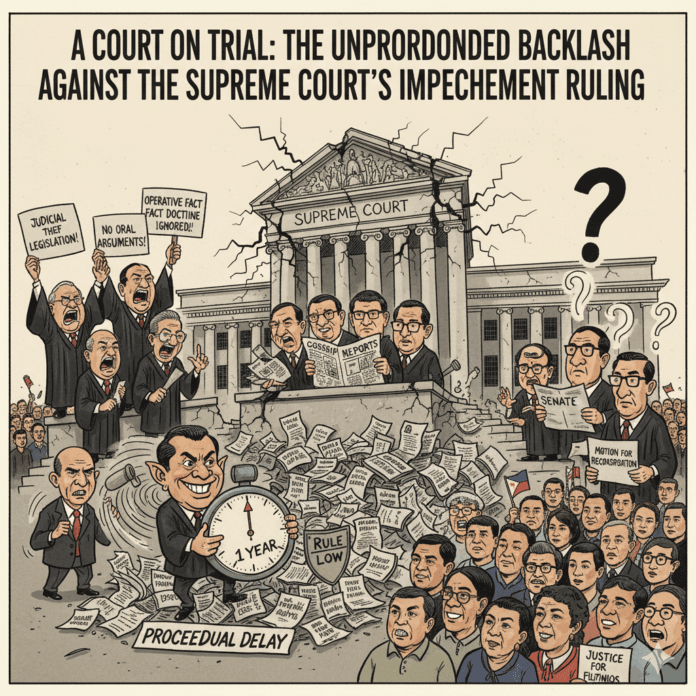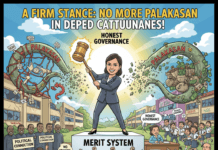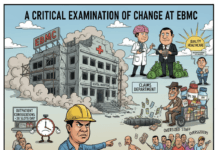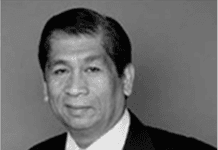In the hallowed halls of Philippine law, the Supreme Court’s word is meant to be the final and unassailable truth. Yet, its recent decision to invalidate the House of Representatives’ impeachment action, citing the one-year bar rule, has not been met with quiet deference. Instead, it has triggered an extraordinary wave of denunciation from the very legal luminaries who have shaped our justice system. This is a rare moment in our nation’s history, where the highest court finds itself squarely on trial in the court of legal opinion.
The chorus of criticism is both loud and prominent. Former Chief Justice Reynato Puno, a figure of immense respect, has openly questioned the ruling. He is joined by other distinguished voices, including former Chief Justice Artemio Panganiban, former Justices Adolf Azcuna and Antonio Carpio, and even former Ombudsman Conchita Carpio-Morales. These are not mere observers; they are the architects of our jurisprudence, and their dissent is a profound signal that something is fundamentally amiss.
The core of their argument is that the Supreme Court overstepped its bounds. Instead of interpreting the law, they argue, the Court engaged in a form of “judicial legislation,” creating a new layer of procedural hurdles that Congress never intended. This, they assert, strikes at the very heart of the separation of powers and hobbles the legislative branch’s ability to hold officials accountable.
A key point of contention is the Court’s apparent disregard for the “operative fact doctrine,” a principle that gives validity to actions taken under a law before it is declared unconstitutional. Legal scholars are quick to point out that this recent decision, rather than building on established precedent like the Francisco v. House of Representatives case, seems to have abandoned it. This creates a dangerous precedent, introducing legal instability where there should be certainty.
The decision is also being scrutinized for its procedural flaws. Critics lament that it was rushed, made without the benefit of oral arguments, which would have allowed for a more robust and thorough examination of the facts. The allegation that the Court based its ruling on newspaper reports rather than taking judicial notice of the official records of Congress further undermines its credibility and suggests a troubling lack of due diligence.
The role of the Integrated Bar of the Philippines (IBP) in this saga has also come under fire. While the IBP has issued a statement “upholding the rule of law,” its explanation has been widely seen as a cautious, almost timid, attempt to navigate a sensitive issue. For many, the IBP’s stance feels like a missed opportunity to champion a more rigorous and just interpretation of the law, a failure to live up to its role as the conscience of the legal profession.
At the heart of this entire controversy is the blatant procedural delay engineered by Senator Chiz Escudero. The articles of impeachment, elevated to the Senate in February, were left to languish. The process was stalled, with a series of postponements and tactical maneuvers that served only to run out the clock. This was a glaring manipulation of the system, a cynical dance around the constitutional mandate of accountability.
The Supreme Court’s ruling, whether intentionally or not, has become the ultimate saving grace for this procedural gambit. By invalidating the House’s action, the Court has given the impression of sanctioning the delay, making it seem as if the law itself, rather than a political strategy, was the true obstacle to justice.
Now, the spotlight turns to the Senate, which is set to convene on August 6 to decide on its next move. The House has wisely filed a motion for reconsideration, urging the Senate to exercise sobriety and recognize that the Supreme Court’s decision is not yet final. The House’s plea is a call for a return to due process and a rejection of the political theater that has consumed this case.
The Senate now faces a critical choice. Should it meekly accept a flawed Supreme Court decision, or should it stand firm on its constitutional duty? The better, more advisable path is for the Senate to recognize the profound flaws in the Court’s ruling—the rushed nature, the factual misapprehensions, and the creation of new legal standards.
The very essence of impeachment is to provide a swift and decisive mechanism for removing officials who have betrayed the public trust. The Supreme Court’s decision, by introducing tedious processes and rigid interpretations, has dangerously weakened this constitutional safeguard. It has, in effect, made impeachment a theoretical rather than a practical tool.
The motion for reconsideration is our last, best hope. We must trust that the Supreme Court will take this opportunity to correct its mistake and heed the powerful, learned voices that have risen in dissent. If the Court stands by its flawed ruling, it risks more than just an academic debate; it risks diminishing its own standing and undermining the very principles of justice it is sworn to protect. The legal community is watching, and so is the Filipino people. (FB-EYE/Ferdinand M. Brizo/BicolPeryodiko)





















